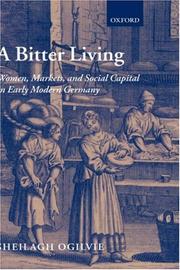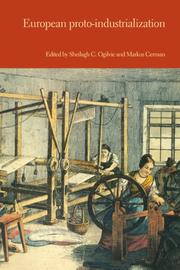| Listing 1 - 10 of 13 | << page >> |
Sort by
|

ISBN: 0521372097 0521025842 0511582862 0511003986 9780511003981 9780511582868 Year: 1997 Volume: 33 Publisher: Cambridge : Cambridge University Press,
Abstract | Keywords | Export | Availability | Bookmark
 Loading...
Loading...Choose an application
- Reference Manager
- EndNote
- RefWorks (Direct export to RefWorks)
State Corporatism and Proto-Industry focuses on an industrial countryside in south-west Germany, where a dense worsted industry dominated the rural economy from 1580 to 1800. This is an example of 'proto-industry', the dense, export-oriented rural manufacturing which arose throughout Europe before factory industrialization. But although the Württemberg worsted industry possessed all the features of a classic proto-industry, closer scrutiny throws doubt on basic assumptions about European proto-industrialization. In this book, Sheilagh Ogilvie shows that proto-industries did not break down traditional society. Instead, corporate institutions such as guilds, merchant companies, village communities and manorial systems retained enormous power. This was a result of 'state corporatism': the expanding early modern state granted privileges to favoured groups in return for fiscal and regulatory co-operation. As Ogilvie shows, these corporate privileges profoundly constrained both individual decisions and economic development.
Guilds --- Industrialization --- Municipal franchises --- Weavers --- Woolen and worsted manufacture --- Woolen goods industry --- History. --- Tisserands --- Lainages --- Laine --- Corporations --- Industrialisation --- History --- Histoire --- Industrie --- Wildberg (Baden-Württemberg, Germany) --- Wildberg (Bade-Wurtemberg, Allemagne) --- Economic conditions --- Conditions économiques --- Wildberg (Baden-Württemberg, Alemania) --- Condiciones económicas. --- Industria de la madera --- Alemania --- Wildberg (Baden-Württemberg) --- Historia. --- Condiciones sociales. --- Arts and Humanities --- Economic conditions. --- Social conditions.

ISBN: 9780198205548 0198205546 0191719218 Year: 2003 Publisher: Oxford: Oxford university press,
Abstract | Keywords | Export | Availability | Bookmark
 Loading...
Loading...Choose an application
- Reference Manager
- EndNote
- RefWorks (Direct export to RefWorks)
History of Germany and Austria --- anno 1600-1699 --- anno 1700-1799 --- Social capital (Sociology) --- Women --- Human females --- Wimmin --- Woman --- Womon --- Womyn --- Females --- Human beings --- Femininity --- Capital, Social (Sociology) --- Sociology --- Economic conditions --- Germany --- Economic conditions. --- Women - Germany - Württemburg - Economic conditions --- Social capital (Sociology) - Germany - Wüttemburg --- Germany - Economic conditions
Book
ISBN: 9780691217024 9780691137544 0691137544 9780691185101 0691217025 0691185107 Year: 2019 Publisher: Princeton: Princeton university press,
Abstract | Keywords | Export | Availability | Bookmark
 Loading...
Loading...Choose an application
- Reference Manager
- EndNote
- RefWorks (Direct export to RefWorks)
"Guilds ruled many crafts and trades from the Middle Ages to the Industrial Revolution, and have always attracted debate and controversy. They were sometimes viewed as efficient institutions that guaranteed quality and skills. But they also excluded competitors, manipulated markets, and blocked innovations. Did the benefits of guilds outweigh their costs? Analyzing thousands of guilds that dominated European economies from 1000 to 1880, The European Guilds uses vivid examples and clear economic reasoning to answer that question. Sheilagh Ogilvie's book features the voices of honorable guild masters, underpaid journeymen, exploited apprentices, shady officials, and outraged customers, and follows the stories of the 'vile encroachers'--Women, migrants, Jews, gypsies, bastards, and many others--desperate to work but hunted down by the guilds as illicit competitors. She investigates the benefits of guilds but also shines a light on their dark side. Guilds sometimes provided important services, but they also manipulated markets to profit their members. They regulated quality but prevented poor consumers from buying goods cheaply. They fostered work skills but denied apprenticeships to outsiders. They transmitted useful techniques but blocked innovations that posed a threat. Guilds existed widely not because they corrected market failures or served the common good but because they benefited two powerful groups--guild members and political elites"--Jacket.
Guilds --- Merchants --- History --- Europe --- Commerce --- History. --- History of Europe --- anno 1200-1799 --- anno 1100-1199 --- Guilds - Europe - History --- Merchants - Europe - History --- Europe - Commerce - History --- European economies. --- European economy. --- Toledo silk-twisters. --- apprentices. --- apprenticeships. --- bribery. --- cartel rents. --- cartels. --- comprehensive training. --- compulsory apprenticeship. --- consumers. --- corrupt governments. --- corruption. --- economic activities. --- economic benefits. --- economic discrimination. --- economic growth. --- economic performance. --- economy. --- entitlement. --- entry barriers. --- exclusive rights. --- exploitation. --- external competition. --- female competitors. --- female masters. --- female workers. --- guild masters. --- guild members. --- guild numbers. --- guild strength. --- guild-free enclaves. --- guilds. --- human capital investment. --- human capital. --- information asymmetries. --- innovation. --- internal cohesiveness. --- internal rivalry. --- invention. --- journeymen. --- legal entitlements. --- male tutelage. --- market failure. --- market failures. --- market manipulation. --- market regulations. --- merchant. --- minimum selling prices. --- political elites. --- political pressure. --- practitioners. --- private-order institutions. --- privileges. --- producer. --- producers. --- quality violations. --- social capital. --- social networks. --- spatial clustering. --- state failures. --- technological innovation. --- technological knowledge. --- work skills.
Book
ISBN: 9781139012058 1139012053 9781139011266 113901126X 9781139011525 1139011529 9780511974410 0511974418 9786613016058 6613016055 9780521764179 0521764173 9780521747929 0521747929 9780521774729 1139012657 1107217199 1283016052 1139011790 1139010999 9781139012652 9781107217195 9781283016056 9781139011792 9781139010993 Year: 2011 Publisher: Cambridge ; New York : Cambridge University Press,
Abstract | Keywords | Export | Availability | Bookmark
 Loading...
Loading...Choose an application
- Reference Manager
- EndNote
- RefWorks (Direct export to RefWorks)
"What was the role of merchant guilds in the medieval and early modern economy? Does their wide prevalence and long survival mean they were efficient institutions that benefited the whole economy? Or did they simply offer an effective way for the rich and powerful to increase their wealth, at the expense of outsiders, customers and society as a whole? These privileged associations of businessmen were key institutions in the European economy from 1000 to 1800. Historians debate merchant guilds' role in the Commercial Revolution, economists use them to support theories about institutions and development, and policy-makers view them as prime examples of social capital, with important lessons for modern economies. Sheilagh Ogilvie's magisterial new history of commercial institutions shows how the answers to such questions can help us understand which types of institution made trade grow, why institutions exist, and how corporate privileges affect economic efficiency and human well-being"-- "Cambridge Studies in Economic History comprises stimulating and accessible economic history which actively builds bridges to other disciplines. Books in the series will illuminate why the issues they address are important and interesting, place their findings in a comparative context, and relate their research to wider debates and controversies. The series will combine innovative and exciting new research by younger researchers with new approaches to major issues by senior scholars. It will publish distinguished work regardless of chronological period or geographical location"--
Book
ISBN: 0691185107 Year: 2019 Publisher: Princeton, NJ : Princeton University Press,
Abstract | Keywords | Export | Availability | Bookmark
 Loading...
Loading...Choose an application
- Reference Manager
- EndNote
- RefWorks (Direct export to RefWorks)
A comprehensive analysis of European craft guilds through eight centuries of economic historyGuilds ruled many crafts and trades from the Middle Ages to the Industrial Revolution, and have always attracted debate and controversy. They were sometimes viewed as efficient institutions that guaranteed quality and skills. But they also excluded competitors, manipulated markets, and blocked innovations. Did the benefits of guilds outweigh their costs? Analyzing thousands of guilds that dominated European economies from 1000 to 1880, The European Guilds uses vivid examples and clear economic reasoning to answer that question.Sheilagh Ogilvie's book features the voices of honorable guild masters, underpaid journeymen, exploited apprentices, shady officials, and outraged customers, and follows the stories of the "vile encroachers"-women, migrants, Jews, gypsies, bastards, and many others-desperate to work but hunted down by the guilds as illicit competitors. She investigates the benefits of guilds but also shines a light on their dark side. Guilds sometimes provided important services, but they also manipulated markets to profit their members. They regulated quality but prevented poor consumers from buying goods cheaply. They fostered work skills but denied apprenticeships to outsiders. They transmitted useful techniques but blocked innovations that posed a threat. Guilds existed widely not because they corrected market failures or served the common good but because they benefited two powerful groups-guild members and political elites.Exploring guilds' inner workings across eight centuries, The European Guilds shows how privileged institutions and exclusive networks shape the wider economy-for good or ill.
Guilds --- Merchants --- History. --- Europe --- Commerce --- European economies. --- European economy. --- Toledo silk-twisters. --- apprentices. --- apprenticeships. --- bribery. --- cartel rents. --- cartels. --- comprehensive training. --- compulsory apprenticeship. --- consumers. --- corrupt governments. --- corruption. --- economic activities. --- economic benefits. --- economic discrimination. --- economic growth. --- economic performance. --- economy. --- entitlement. --- entry barriers. --- exclusive rights. --- exploitation. --- external competition. --- female competitors. --- female masters. --- female workers. --- guild masters. --- guild members. --- guild numbers. --- guild strength. --- guild-free enclaves. --- guilds. --- human capital investment. --- human capital. --- information asymmetries. --- innovation. --- internal cohesiveness. --- internal rivalry. --- invention. --- journeymen. --- legal entitlements. --- male tutelage. --- market failure. --- market failures. --- market manipulation. --- market regulations. --- merchant. --- minimum selling prices. --- political elites. --- political pressure. --- practitioners. --- private-order institutions. --- privileges. --- producer. --- producers. --- quality violations. --- social capital. --- social networks. --- spatial clustering. --- state failures. --- technological innovation. --- technological knowledge. --- work skills.
Book
ISBN: 052145798X Year: 1993 Publisher: Cambridge Cambridge University press
Abstract | Keywords | Export | Availability | Bookmark
 Loading...
Loading...Choose an application
- Reference Manager
- EndNote
- RefWorks (Direct export to RefWorks)
Article
Abstract | Keywords | Export | Availability | Bookmark
 Loading...
Loading...Choose an application
- Reference Manager
- EndNote
- RefWorks (Direct export to RefWorks)
Article
Abstract | Keywords | Export | Availability | Bookmark
 Loading...
Loading...Choose an application
- Reference Manager
- EndNote
- RefWorks (Direct export to RefWorks)

ISBN: 0521497388 0521497604 9780521497602 9780521497381 Year: 1996 Publisher: Cambridge: Cambridge university press,
Abstract | Keywords | Export | Availability | Bookmark
 Loading...
Loading...Choose an application
- Reference Manager
- EndNote
- RefWorks (Direct export to RefWorks)
This collection of essays provides an up-to-date introduction to 'proto-industrialization': the growth of export-oriented domestic industries which took place all over Europe between about 1500 and 1800. Often these industries expanded alongside agriculture, without advanced technology or centralised factories. Since the 1970s numerous theories have been proposed, arguing that proto-industrialization transformed demographic behaviour, social structure and traditional institutions, and was a major cause of capitalism and factory industrialisation. European Proto-Industrialization summarises the theories and criticisms, and includes chapters written by experts on different European countries. It provides an essential guide to an important, yet often confusing, field of economic and social history.
History of Europe --- anno 1800-1999 --- Industrialization --- Industries --- History. --- -Industries --- -Industrial production --- Industry --- Economics --- Industrial development --- Economic development --- Economic policy --- Deindustrialization --- History --- -History --- Europe --- Industrialization - Europe. --- Industries - Europe - History. --- EUROPE --- REVOLUTION INDUSTRIELLE --- CONDITIONS ECONOMIQUES --- 16E-19E SIECLES --- HISTOIRE --- 17E-18E SIECLES
Book
ISBN: 3851151992 9783851151992 Year: 1994 Volume: 5 Publisher: Wien: Verlag für Gesellschaftskritik,
Abstract | Keywords | Export | Availability | Bookmark
 Loading...
Loading...Choose an application
- Reference Manager
- EndNote
- RefWorks (Direct export to RefWorks)
Industrialization --- Industries --- Industrialisation --- Industrie --- History. --- Histoire --- History --- Industrialization - Europe --- Industries - Europe - History
| Listing 1 - 10 of 13 | << page >> |
Sort by
|

 Search
Search Feedback
Feedback About UniCat
About UniCat  Help
Help News
News